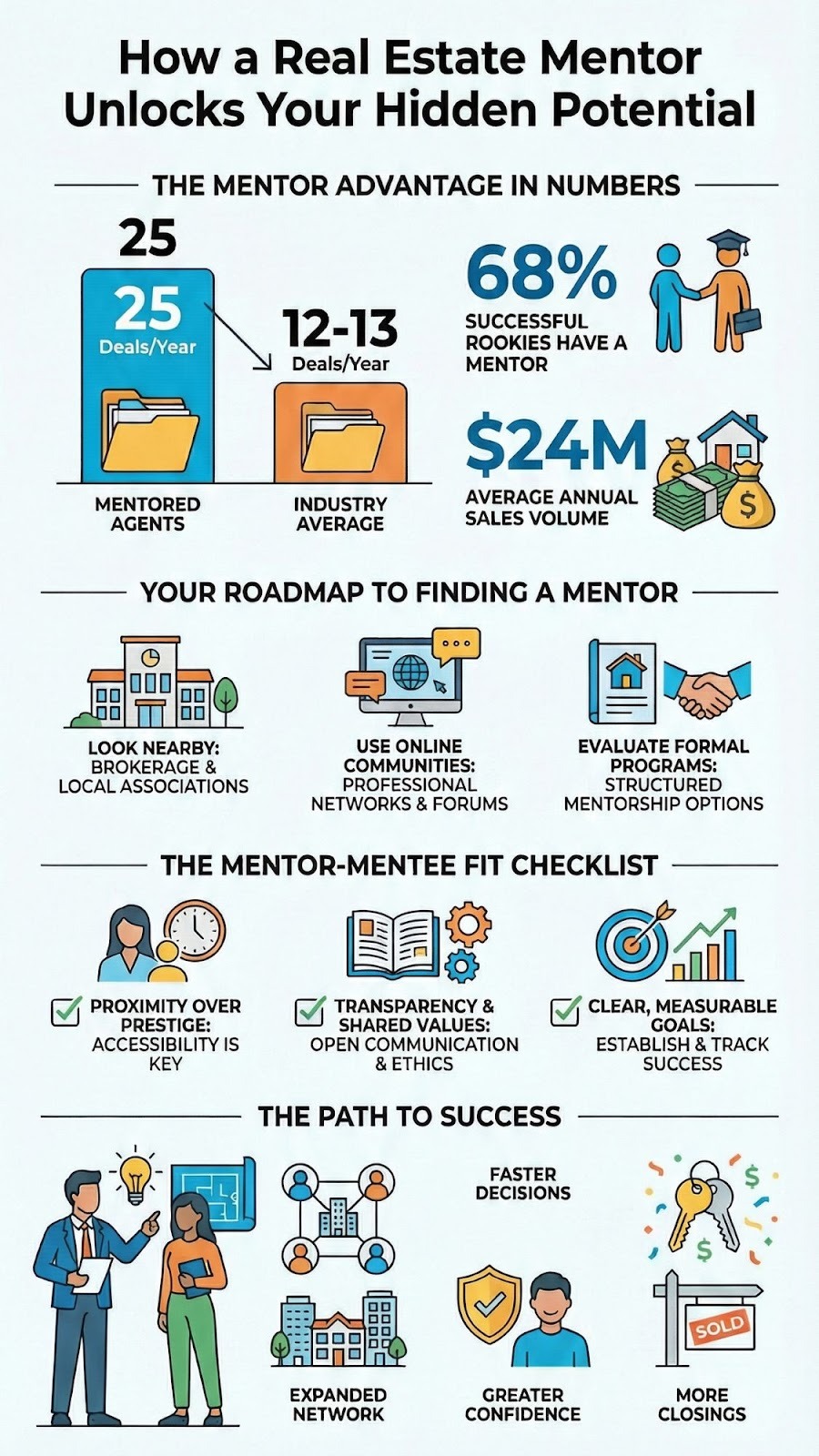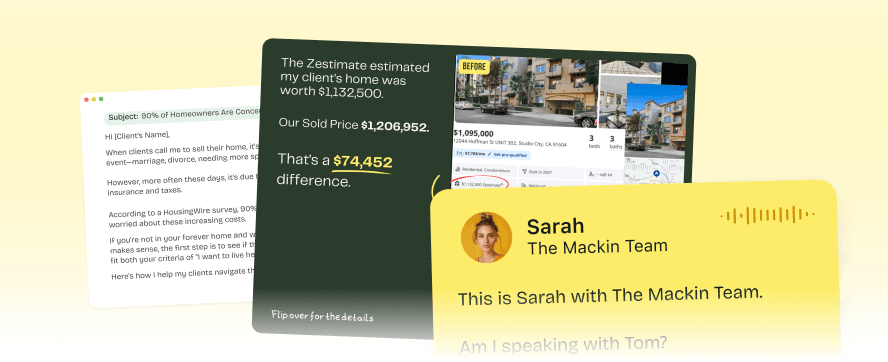
How to Find the Right Real Estate Mentor and Accelerate Your Growth
A real estate mentor isn’t a luxury reserved for a few lucky agents. It’s one of the most powerful accelerators your career can have. Here’s why it works, and how to find the right one for you.
You’re hosting open houses, chasing leads, following the training step by step. Still, the real breakthroughs, the steady closings, the feeling of momentum you can count on, stay just out of reach.
The missing piece isn’t another course or a more polished CRM. It’s a guide.
A real estate mentor isn’t a luxury reserved for a few lucky agents. It’s one of the most powerful accelerators your career can have. Here’s why it works, and how to find the right one for you.
Key Takeaways
- Agents with mentors close more deals, earn more, and are far more likely to survive the critical first five years.
- The right mentor is a few steps ahead, shares your values, and is open about both wins and losses.
- Strong mentorship thrives on clear goals, shared value, and consistent follow-through from the mentee.
Why a Real Estate Mentor Changes the Math of Your Career

Think about the last time you hit a confusing contract clause or a client raised an objection you hadn’t seen before. You probably scrambled for an answer, asked around, or made your best guess. Now imagine having someone on call who’s handled that exact situation dozens of times.
That’s the difference.
What many agents miss is how mentorship actually works in practice:
- It transfers real-world experience straight into your business
- It speeds up decisions instead of leaving you stuck, especially when refining real estate lead follow-up strategies that turn conversations into consistent closings
- Mentored agents close deals faster
- Formal mentorship programs average 25 transactions per year
- That’s more than double the industry average
- Average annual sales volume reaches $24 million
It works because a mentor compresses time. 68% of successful first-year agents credit a mentor as the key factor (1). Years of trial and error turn into clear steps you can act on this week.
The Hidden Advantage of Having a Real Estate Mentor
A mentor gives you feedback that’s immediate and personal, not generic. They notice blind spots early,inefficient habits, missed local opportunities, weak negotiation moments,before those mistakes cost you a deal.
But the real advantage runs deeper. A mentor creates accountability.
- Closes the experience gap faster than learning alone
- Offers market-specific, personalized feedback
- Keeps your goals visible and measurable
- Expands your network through theirs
Setting a goal is easy. Knowing you’ll report back to someone you respect is different. That outside accountability is often what helps a habit stick long enough to matter. Over time, this becomes the foundation of a career that scales instead of sputtering.
Your Roadmap to Finding the Right Guide

Knowing you need a mentor is one thing. Finding the right one takes intention. You’re not searching for a celebrity speaker. You want a practical guide.
Start by Looking Around You
Your best prospects are usually close by. That top producer in your brokerage. The seasoned agent who stays calm when things get messy. You don’t need a formal pitch,just a thoughtful approach.
Instead of asking, “Will you mentor me?” try something more specific:
“I saw how you handled that inspection negotiation last month. I’m dealing with something similar. Could I buy you a coffee and get your perspective for 20 minutes?”
It shows respect, preparation, and clarity. It opens a conversation instead of asking for a commitment.
Tap Into the Power of Associations
Your local REALTOR® board or real estate investment association isn’t just for credits. These spaces are full of informal mentors.
Volunteer. Attend mixers. Talk to experienced agents in the room, not just the speaker at the front. Many organizations already run mentorship programs or make introductions.
Don’t Underestimate the Digital Watercooler
Online communities may feel distant, but for real estate professionals, they’re often where strong relationships begin.
- Participate actively
- Ask thoughtful, specific questions
- Share small wins and lessons
- Notice who gives consistent, useful advice
- Engage regularly to build trust
- Let relationships form naturally before meeting in person
It’s a low-pressure way to understand how someone thinks before committing.
Evaluate Formal Programs Seriously
Larger brokerages and coaching groups often offer structured mentorship or bootcamps, and the best real estate coaches design these programs to function more like apprenticeships than lectures.
Look for clarity. How often do you meet? What’s the structure? How is success measured? Is there ongoing support? Strong programs are built around application, not motivation alone.
Seek Proximity, Not Just Prestige
The best mentor isn’t the agent closing 500 deals a year (2). It’s the one who closed 30 last year, just added their first investment property, and still remembers what early mistakes feel like.
Agents without hands-on guidance are far more likely to stall early. Someone who remembers the struggle often teaches more effectively than a distant superstar.
Prioritize Transparency Over Perfection
You want someone who talks about deals that failed, not just the wins. Real estate is messy. Financing collapses. Inspections derail plans. Clients change their minds.
Honest stories build trust and deliver real education. They also sharpen the mentor’s own skills by forcing reflection and clarity.
Align on Values and Working Style
This is non-negotiable. If you build your business on relationships and referrals, a mentor focused solely on aggressive cold outreach may not help you grow.
Look for shared views on clients, marketing, and balance. When values align, advice lands better,and those late-day phone calls feel easier.
Building a Relationship That Actually Works

Once you’ve found your mentor, the results depend largely on you.
Lead with Clarity, Not Vagueness
Be direct from the start. “I want to close my first investment deal in six months and need help analyzing opportunities. Could we meet twice a month to review my pipeline?”
Clear goals show respect and seriousness. Mentees who set measurable targets reach them far faster than those who keep things loose.
Bring Something to the Table
Mentorship isn’t one-sided. Offer what you can. Maybe you understand social media. Maybe you track neighborhood data well.
Maybe you’re experimenting with YouTube video marketing to win more listings and can share what’s resonating locally. Maybe you take great notes and send summaries after meetings.
Small contributions shift the relationship from obligation to collaboration. When mentors feel that balance, they stay engaged longer.
Execute Relentlessly
This is where trust is earned. Try the script they suggest. Update the presentation they critique. Implement feedback quickly and report back.
Seeing advice put into action is energizing. Follow-through fuels the entire relationship and accelerates skill adoption.
The Compounding Returns of Guided Growth
Credits: Jimmy Mackin
A real estate mentor isn’t a short-term fix. It’s a long-term investment.
- Their network becomes your network
- Their confidence becomes yours
- Their strategic thinking shapes your instincts
- Your credibility grows faster
- Decisions get quicker and clearer
When the market shifts,and it will,you won’t panic. You’ll adapt. You’ll have a sounding board when things slow down, speed up, or change direction entirely. Mentorship protects your downside and expands your upside.
FAQs
What is a real estate mentor
A real estate mentor is an experienced agent who guides your growth. They share real lessons from actual deals, not theory. They help with contracts, clients, and daily decisions, showing what works and what doesn’t. A mentor also offers support when things feel tough, helping build confidence over time.
Why do new agents need a mentor
New agents face constant decisions. A mentor brings clarity. Instead of learning everything the hard way, you benefit from experience. Mentors help avoid costly mistakes and keep focus when things feel overwhelming, making it easier to stay consistent and succeed.
How does a mentor help you close more deals
Mentors introduce simple systems for conversations, follow-up, and problem-solving. They provide fast answers when you’re stuck. With feedback and practice, skills improve quickly. Better skills lead to stronger trust and more signed contracts.
Is a mentor only for beginners
No. Agents at every stage benefit from guidance. Markets shift, goals evolve, and challenges change. A mentor offers perspective and steady input, helping even experienced agents stay sharp and focused.
How do you find the right mentor
Look around your workplace and local groups. Notice agents who are consistent, calm, and helpful. Choose someone a few steps ahead, not far removed from your path. Ask for short, respectful meetings and see if values align.
What should you expect from a mentor
Expect guidance, not shortcuts. A mentor provides honest feedback, examples, and support,but the work is still yours. Growth comes from listening, practicing, and following through.
What does a good mentee do
A strong mentee prepares, listens, and takes action. They respect time, ask clear questions, and apply advice. Reporting back builds trust and strengthens the relationship.
How often should you meet a mentor
Twice a month works well for many. Some prefer weekly or monthly check-ins. Consistency matters more than frequency. Focused, regular sessions build momentum.
Can a mentor help with confidence
Yes. Mentors normalize mistakes, share their own struggles, and help you prepare for tough conversations. Small wins add up, and confidence grows when you know someone experienced has your back.
Is mentorship worth the effort
Yes. Mentorship saves time, reduces stress, and shapes better habits early. The lessons compound over years, leading to steadier growth and stronger decisions throughout your career.
Why Guidance Turns Effort Into a Repeatable System
The real question isn’t whether you can afford a mentor. It’s whether you can afford not to have one. Most successful careers aren’t built alone. The right guide makes the path clearer, faster, and more sustainable.
Ready to stop guessing and start building with confidence? Explore how structured guidance can accelerate your path at ListingLeads.
References
- https://www.sciencedirect.com/science/article/pii/S2666602221000173
- https://www.sciencedirect.com/science/article/pii/S0896627322000095
Related Articles
- https://listingleads.com/blog/real-estate-lead-follow-up-strategies
- https://listingleads.com/blog/best-real-estate-coaches
- https://listingleads.com/blog/youtube-masterclass-how-to-win-more-listings-through-video-marketing

You’re about to make a really smart decision.
ListingLeads.com is your go-to source for all the marketing and sales campaigns you need to attract more listings. Join more than 3,000 agents and get instant access to 285+ proven listing attraction campaigns.

